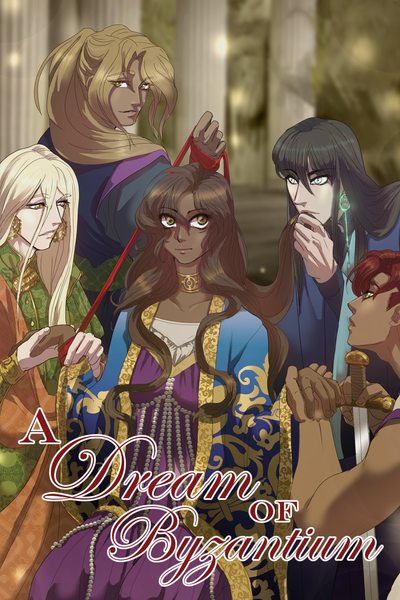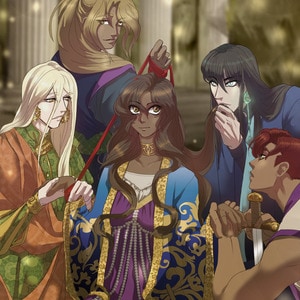It was a phrase she had heard enough times in the milieu of liberal politics, and she never paid much mind to it, but now she was questioning what had led her mind to conspire such a vivid, gruelling depiction of a boring service job nine-to-five? Was she so domesticated that she could only dream of labour?
“You’ve done great, lassie,” Felicia said with a smile when she saw Ophelia come in with a basket full of clean glasses from the backyard. “I thought a princess like you would have trouble with this sort of thing, but it seems like you’ve been doing this for years!”
Ophelia thought that perhaps the dream wasn’t quite about labour, but of a life where she was actually acknowledged by the people around her. Normally, upon meeting her, people had made very little effort at continuing a conversation past the opening lines, somehow catching that unheard directive of the universe that she wasn’t quite supposed to be in the room. But since she had arrived in that strange world, people talked to her normally, and even seemed interested in her. It was daunting, and a bit exciting.
“I’m not a princess,” she corrected her new boss.
“Oh?” Ophelia looked into the cauldron by the fire; she’d been told earlier that by the end of the night they could scrape what was left and eat it, and if it was too much, leave it for the next day’s breakfast. She served bowls for the three of them.
“Oh, get us some more,” Felicia said. “The Phrygians wanted to have some food before heading out.”
The new employee did so dutifully, and the elder woman ushered her and Lucio back into the main room of the tavern with the bowls. It had emptied out naturally as the fishermen and the merchants went back home to retire for the night. Only the guests of the inn were hanging about with her hands still full of ale, and this time they were all to join for supper.
“I hope you slept well,” said the tavern owner in a heavy Phrygian accent as she took a seat next to Ophelia, across from Phobos and Aristides.
“It would have been better with a woman by my side,” complained Ajax, which earned him some stern stares from the leader of the troop.
“You’ve moaned enough, we’ll go after this,” the small warrior said. “Are you coming, Il?”
“I’ll go for the drink, I’m not in the mood for that.”
“Where are you going?” asked Ophelia, more so for the sake of the conversation than out of any real interest.
“Maybe the princess would like to come,” Ajax replied slyly. “She can recommend some women, perhaps?”
Ophelia was a bit lost and it showed in her face, which prompted a few laughs around the table. “They’re going to a brothel,” explained Remulus, trying to be helpful. Ophelia pulled a face. Ajax smiled.
“Is it not something that the people of Londinium do? Perhaps their men carry their wives in their pockets?”
“They don’t,” Ophelia answered, “and they certainly do go to brothels. But are you not afraid of catching disease?”
“Disease?” Ajax snorted. “Warriors don’t live long enough to worry about that.”
She turned inquisitive eyes towards the rest of the men, landing on Phobos last. “Are you not going?”
“I’m too tired,” replied Remulus.
“I’m too old,” smiled Aristides.
Ophelia was curious about the stern prince’s response; he refused to meet her eyes as he answered, “I don’t enjoy those places.”
“Lord Phobos hates merry company,” Ajax interjected. “He’d rather spend time sharpening his swords.”
He snickered at his own innuendo, followed by Ilmarinen and even Remulus. “You can keep him company if it worries you, lady,” quipped the former, looking for all intent and purposes like a teenager trying to be witty.
Ophelia had but a moment to find a way to put into words what she was thinking. Somehow the stars aligned and she rebutted them with an “at least with him I’ll be able to walk out of bed without suffering for it”, which earned her some whistles as Ilmarinen shrank back into his seat. He clearly was not expecting a comeback at all.
“Hibernian women sure are all that they’re said to be,” Ajax said over the rim of his glass, appreciatively. Phobos, however, had had enough of the schoolchildren talk, and cut through drily with a warning: “with the way you’re talking one would think the war was not over. Do what you must, but remember there are many eyes watching, and we don’t know when we’re going to come across an ambush.”
“In foreign lands one should never spend the night in the bed of a foreign woman,” Aristides interjected, looking pointedly at Ajax.
“Do you want me to come snuggle you, old man?”
The good-natured bickering continued for some more time. The trio of would-be lovers soon made a hasty exit, trying as they would to add more men to their cause. After that things seemed to die down; Remulus retired for the night, and Lucio soon followed as well. Phobos, Aristides and Felicia remained in their seats, wanting to catch up. Ophelia just sipped at her ale, silently listening in, not really feeling tired enough to sleep.
She learnt then that Aristides and Felicia had known each other for a long time; the tavern owner had been briefly married to a cousin of his who had passed away due to a plague some fifteen years before. Although far from the Phrygian kingdom, she still kept regular correspondence with her husband’s family, and had been watching the developments with some concern. From her limited place there was little she could do but offer them some sanctuary; it was a risky move given that the exiled prince was a person of interest to the Elysian authorities, which held in writing absolute control over the government in Caudiceum.
“My Phrygian is going rusty,” she complained, winking at Ophelia. “It’s good you can speak so fluently, I’ll be able to keep practising it. But, how did you come to learn it?”
The topic kept coming up, and Ophelia just felt embarrassed that she had to keep lying. Wasn’t that such a cliché trope in fiction? A comedy of errors and misunderstandings, one building on top of the other, like a castle of cards that will fall at the smallest breeze. Aristides commented something about the mysterious tutor she’d somehow gained in the last day, and she felt like she couldn’t take it anymore.
“I didn’t have a tutor,” she said, suddenly. Three pair of confused gazes rested on her. “I went to school in London, I had teachers… I’m not a princess or anything like that; I simply appeared here, and as far as I can tell, this is a different world from the one I am from.”
“What a strange joke,” Phobos said dryly, “is there a punchline?”
“There’s none,” Ophelia raised her eyes, somehow sick of her lack of answers. “I don’t know how I ended up here, or how is it that I can speak your languages. I certainly couldn’t understand you when you picked me up.”
“So you’re saying you’re… from another world?” Felicia repeated slowly.
“I think so, yes. At first I thought I might have gone back in time, but this is too different from the history I know.”
Aristides and Phobos remained sceptical, but it was clear that they weren’t going to pursue the matter. Perhaps the princess was an eccentric and liked to invent stories; perhaps it was a ploy to claim innocence of some perceived charge in the future. Her endgame was unclear to them, not that it mattered: their paths would soon diverge.
“Well, if anything, you do look the part at least!” Felicia commented, and answering Ophelia’s confused look, she said, “your hair and your eyes are not quite the right shade, you know? It’s like they’re lacking some vibrancy to them. And that clothing you’re wearing… it’s all strangely adorned, and the material is unlike any linen or wool… or cotton I’ve seen.”
The matter died after that, and the conversation soon followed. By ten, they had all retreated to their quarters. Felicia’s words, however, were fresh on her mind as she laid down. Closing her eyes, she recalled her companions, and her boss herself. She had noticed it, of course, but wasn’t yet ready to surface it as a thought in her head: their appearance, while not terribly foreign to a Londoner like her, still had some uncanny differences to what she would perceive as normal. The chief ones were the vibrancy of their colours: their eyes were all rich hues, almost on the edge of looking synthetic to her. Their hair, similarly, might look normal under moon or candle light, but once the sun had come out it appeared equally out of place, with a sheen and an undertone that seemed more like an artifice than a natural gift.
It was why she had been forced to speak out loud what she hadn’t yet quite admitted to herself: that she wasn’t in a dream, but had somehow landed in another world. But now that it had been said, she felt strangely at peace. It was good, after all, to know she wouldn’t wake up again in the discomfort of her life in London.











Comments (0)
See all